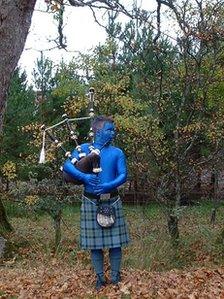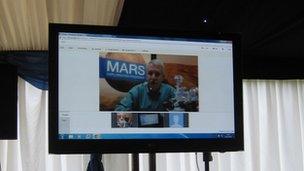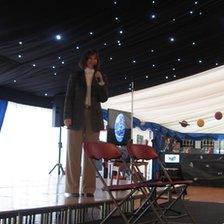Life and soul of the Mars party
- Published

The community of Glenelg in the Scottish Highlands has twinned itself with Glenelg on Mars. BBC News Scotland online sampled Saturday's party atmosphere.
It was only a matter of time before someone asked the question.
"Are there any aliens on Mars?" said a boy somewhere in the crowded marquee erected on a small football pitch in Glenelg.
Doug McCuistion, director of Nasa's Mars exploration programme, smiled before answering. "Well, that's what we hope to find out: that Mars was once able to support life."
McCuistion, who had hoped to be in the west Highland community of about 280 people in person, addressed the gathering via a satellite link from the US.
Many of the 500 folk who had bought tickets for the celebrations had got into the spirit of things. They wore alien antenna hair bands. Glitter from the sparkly balls wobbling above their heads soon covered hair and clothes like fallen stars.
McCuistion took more questions and his answers revealed many facts about the Mars rover, Curiosity, and the Red Planet:
•The rover could have enough power to last 20 years.
•It suffered no damage in the landing
•Mars' red colour is caused by oxidisation of iron in the soil
•The Martian day lasts 24 hours and 45 minutes
•It snows on Mars and scientists have observed water-based and CO2-based snow
•3.5-4 billion years ago it once rained just as it was over Earth-bound Glenelg on Saturday
•By the 2030s or 2040s, McCuistion believes humans will land on the Red Planet and take Curiosity back to Earth and hand it to a museum
McCuistion said Glenelg on Mars was a "very important site" because of what appeared to be unusual geology that Nasa scientists are eager to investigate.

The head of the Mars exploration programme spoke via a video link
He praised Ross-shire's Glenelg for having the imagination and determination to pull off a celebration of Curiosity reaching its namesake on another planet.
Those gathered in the marquee watching McCuistion on a plasma TV applauded loudly.
Prof John Brown, Astronomer Royal Scotland and a resident of Skye, which lies just across the Kylerhea Straits from Glenelg, was the event's compere.
When not enthusing the crowd about astronomy he was entertaining it with magic tricks.
Prof Brown introduced the celebrations' headline act - former Nasa astronaut Bonnie Dunbar.
The farm girl from Washington State worked as an engineer on Nasa space shuttles and has made five flights into space.
She gave a potted history of her childhood and career.
Dunbar's paternal grandfather left Dundee for America in 1909 and her grandmother a few years later from Gardenstown in Banffshire. The pair met at baseball game in Oregon.

Nasa space shuttle engineer Bonnie Dunbar has made five space flights
Their granddaughter Bonnie grew up with Jules Verne and HG Wells' stories. However, a science fiction book published in 1945 by Scotsman John Keir Cross had a huge impact on her. Cross's children's novel, The Angry Planet, tells of two boys and a girl stowing themselves away on a spaceship from Pitlochry to Mars.
During her talk, Dunbar praised the record of the now retired space shuttle vehicle and said she hoped to debunk suggestions the 1969 Moon Landing was faked.
Dunbar, who is retired but still works on occasions for Nasa on strategy for exploration, said she hoped youngsters in the audience would become the engineers and scientists of the future who would help humans get to Mars.
As McCuisition and Dunbar did, Prof Brown praised the west Highland Glenelg's gumption to twin itself with the one on Mars. There are also Glenelgs in Ontario, Canada, and Adelaide, Australia.
Even if those other Glenelgs had tried to do the same they would have struggled to match the hospitality and imagination of the Scottish one.
It had provided performers dressed as blue aliens who blew bubbles and played the bagpipes. There was also a race-against-the clock competition using a replica rover built by enthusiasts from Shetland, a memory card with a message from The Sky at Night's Sir Patrick Moore and a Tartan Martian Ceilidh with cocktails called Red Planet and Little Green Men.
Glenelg resident and writer, Eddie Stiven, summed it up. He said even if Curiosity made the startling discovery of a pub on Mars it could in no way compare to one in Highland Glenelg - it would have no atmosphere.
- Published17 October 2012
- Published24 September 2012
- Published23 August 2012